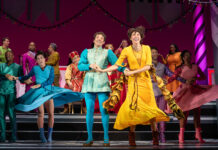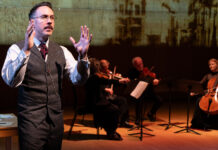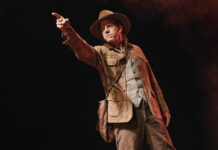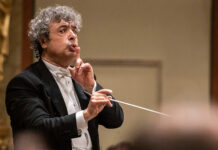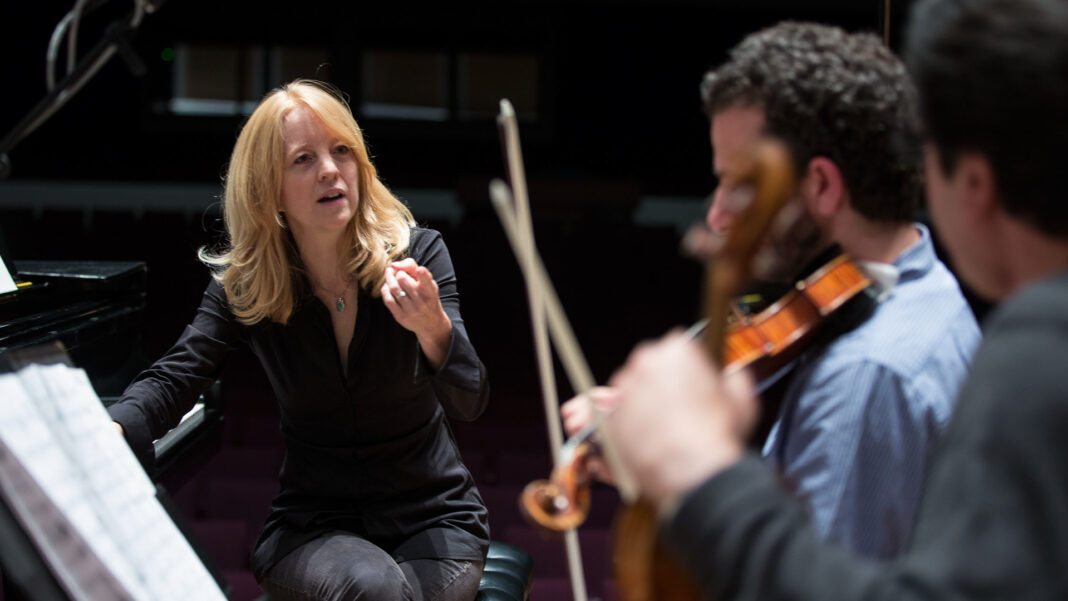Midway through my conversation last week with jazz composer and big band leader Maria Schneider I mentioned that she doesn’t play it safe. With a laugh she immediately responded, “Like having a big band. Let’s go there for starters.”
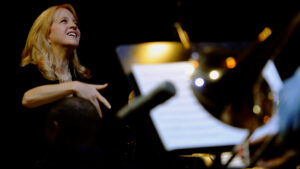
Not playing it safe has proven to be quite successful for Schneider. She is a 7-time Grammy Award winner. Her most recent album, Data Lords, not only earned her two of those trophies, but Schneider was also a Pulitzer Prize finalist. In its first half Data Lords examines tech companies and their control of our lives and information. Then second half allows for communion with nature. It’s a monumental work and one that she is only now able to support through live performances.
The Maria Schneider Orchestra starts a min-tour of the West Coast this weekend with appearances on Friday at Walt Disney Concert Hall; Stanford University on Saturday and Sonoma State University on Sunday.
Before we got into the themes of Data Lords, I first asked Schneider about something legendary bandleader Mary Lou Williams told Marian McPartland in 1964: “Anything you are shows up in your music. Jazz is whatever you are playing yourself, being yourself, letting your thoughts come through.” Exactly 50 years later Schneider told Ted Panken, in a Downbeat interview, that the biggest thing that inspired her about Gil Evans was “knowing him and seeing how devoted he was to being himself.” What point in your career did you realize that being yourself was pivotal in terms of being able to fully express who you were as an artist and who you were as a person?
I think that in life so many people struggle with the questions of who am I, am I forgetting how to express that? I think this is something that a lot of people struggle with when they’re young and maybe when they’re old and their entire life. When I worked with [composer/arranger] Gil [Evans] and when I worked with [pianist/composer] Bob Brookmeyer and when I was around people like [drummer] Mel Lewis and all the greats that there are, they all have that thing that is just identifiable and that it’s them. And I wondered how somebody found that and it was through studying with Bob Brookmeyer that I found it.
Your music becomes you. It reveals you. You don’t say, “Oh, this is this because this is who I am.” Your music starts to reveal you to yourself. I would say that art helps you know yourself. It helps people find that thing in themselves that maybe eludes them for almost a lifetime.
As Stephen Sondheim wrote in Sunday in the Park with George, it all starts with “a blank page.” How intimidating is that blank piece of paper before ideas start being added to it?
That is the process of writing: getting people to ask questions and to take risks and try things they don’t know how to do and dare to have it fail. I got the really great experience of working with David Bowie a few years ago and and he was so great because I was so scared and I was like, “Oh my god, David, what if it sucks? What if you just regret having come to me about this and singing with a big band?” And he just laughed. I’ll bet he had fear here and there, too, but it sure didn’t seem like it. He said “The amazing thing about music, the fantastic thing is that if you fail, if the plane crashes, we all walk away.” It really is true. We feel like we’re going to die if something creative we do isn’t good. It preceded this music on Data Lords, maybe almost all of it. And so that gave me courage to try crazy things and throw it all on the paper.
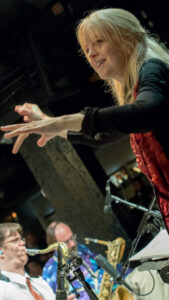
What role do your musicians – to whom you give enormous respective and attention in your concerts – play in realizing your compositions?
For me the thing of connecting to musicians and people playing my music – that energy feeding me is so important. I mean, it’s the reason I’m a jazz composer because my music isn’t completely formed and then they bring something to it. Then that makes me want to write something. So much of my music would not be my music without them. Not just because of the way they play it. I literally wouldn’t write what I’m writing without the ways in which they are like my limbs.
Not being able to tour behind Data Lords must have been frustrating. After its release and now that you have been able to perform that work live, what responses are you getting?
It was a bummer because I couldn’t sell CDs on the road and I always do that and we had a big promotional tour planned. Everything was canceled. As a matter of fact that’s what this tour is replacing. My band is only just geared up. Last week we played a full week in New York. It was the first time we’ve really done something other than a single gig last November and played it on a dock in DC for an hour in September. But other than that, we have not played. So we’re just getting back in the saddle again it.
It was really remarkable that Data Lords really hit home because people found themselves straddling both worlds that I’m talking about: the world of big data that we depend on, that you and I are speaking through. I didn’t even know what Zoom was prior to COVID. And then maintaining connection or trying to step away. That struck people. So I’m writing about awe walks like AWE, you know, going out and reconnecting with birds and nature and valuing what we lost. People really embraced the concept a lot.
I assume that your position on the Googles and Spotify companies of the world has been supported by other musicians.
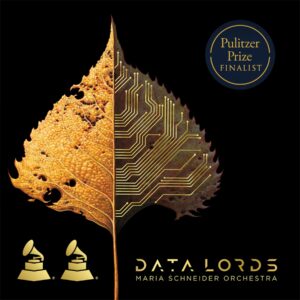
Oh, yeah, and students – mostly students. When I go to colleges they just don’t know what to do. I have musicians all the time thank me. I’m like, “Why don’t you get behind the horse too? I can’t drag this corpse along by myself, you know?” It’s such a full-time job just being a musician and it seems so daunting and impossible to fight the tide, but the tide is unfair. The tide is about taking the value of our music and turning it away from being money into data for them. They’re giving something away, that a lot of times they don’t have the right to to be giving on their site – in exchange for getting the data.
I spent months writing one piece and then thousands and endless thousands rehearsing it and recording it. We’re talking a quarter million dollars to make Data Lords. Then somebody is sharing that for free? I’ve got a pretty small niche audience so I need to be able to set my own price so that I have a chance in making that money back so I can make the next record.
You have described your education as “largely self-taught. I studied scores and I watched the band rehearse.” In fifty or sixty years when up ‘n’ coming composers and arrangers are studying your scores, what would you like them to discover about your work?
I would hope it would be maybe broad picture things kind of like it was for me with Bob and Gil. I hope that whatever they find in my music might be different for different people. That it would inspire them, like Gil and Bob did, just to explore their own things. Because in the end I don’t want to sound like Bob. I don’t want to sound like Gil. I wanted to figure out who Maria is and I think that’s the beauty in music and art; everybody trying to find out who they are. If there are a few little nuggets here and there that they find in my music that helps them get there, go for it.
For tickets to any of the three concerts click on the link in the third paragraph. To purchase DATA LORDS click on the link in the second paragraph.
Main photo: Maria Schneider (Photo by Greg Helgeson/Courtesy of the artist)


